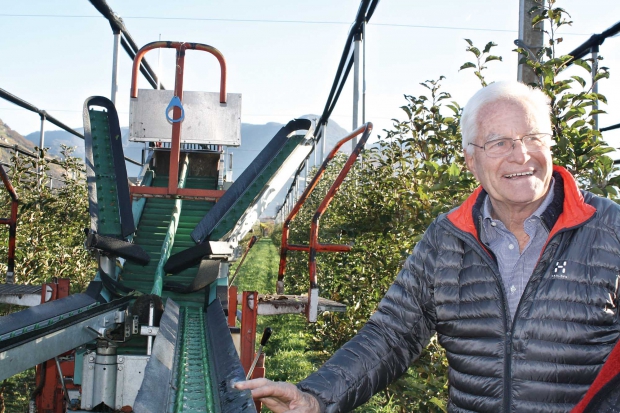
Kurt Komiss has three of these Munckhof Pluk-O-Trak apple harvesters for his 60-plus acres of apples. His farm has several platforms, especially useful for dealing with the hail net that covers 90 percent of his acreage. (Richard Lehnert/Good Fruit Grower)
The IFTA group visited two growers, one in the lower valley near Bolzano and one at a higher elevation at Schenna near Merano.
The Bolzano farm is operated by Kurt Komiss and his son, Michael, along with several other family members. He has developed a thriving side business that his wife, mother, and grandmother run making and marketing dried apple slices. Some of the touring IFTA members tried them, then stuffed their pockets with the crisp, light, flavorful, donut-shaped, potato chip-like tidbits.
Kurt insists the secret is the apple they use—Elstar, a tart apple with strong flavor. Each apple is sliced independently, impaled by hand on a small machine that makes the slices and removes the core. Slices need to be dried for a full day in a dryer. He has more than an acre of Elstars just for drying.
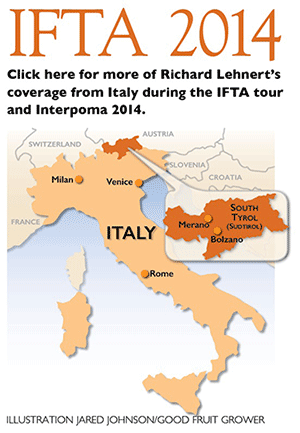 The Komiss farm is large by Tyrol standards, with 23 owned acres and 40 rented. The family hires one Czech worker full-time, and hires additional workers from the Czech Republic and Poland for harvest.
The Komiss farm is large by Tyrol standards, with 23 owned acres and 40 rented. The family hires one Czech worker full-time, and hires additional workers from the Czech Republic and Poland for harvest.
They grow about 1,600 metric tons a year—about 85,000 bushels—growing Gala, Braeburn, Kanzi, Granny Smith, Red Delicious, Pink Lady, and small amounts of others, including the Elstar for drying.
All apples in the Tyrol are grown on M.9 rootstock, and 90 percent of the Komiss apples are under hail nets. More than half of all the Tyrol apples grow under hail nets. The farm is well equipped, with three tractors, three sprayers, two mulching mowers, two apple transport trailers, two platforms, and three Munckhof Pluk-O-Trak harvesters.
The farm is a member of three cooperatives. One of them is the equivalent of the American Cooperative Extension Service, the South Tyrolean Extension Service for Fruit and Wine Growing, but it’s grower-owned. It has unusual powers. Not only does it advise growers on when to spray for apple scab, their major problem, but it tells growers what they must use. Pesticides are tightly controlled across South Tyrol.
Everyone also must participate in the mating disruption program for control of codling moth. “I don’t spray for codling moth at all any more,” Komiss said.
The Komisses use a six-person crew on the Pluk-O-Trak, and they harvest about 5.5 boxes per person per day, he said. He pays by the hour—about 7.5 euros, or $10, plus providing meals and breaks during the day and a place to live. Two-hour lunch breaks are not uncommon across South Tyrol.
To help his workers earn extra money, Komiss offers them “extra work” picking up dropped apples. There is a processing plant dedicated for them, he said. He likes doing it because it keeps his orchard floor free of rotting apples and makes use of a product that would otherwise go to waste.
Klotzner Farm
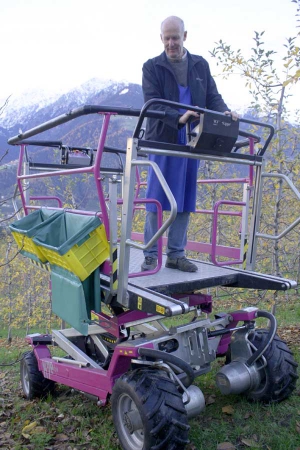
Stefan Klotzner’s farm is very steep, but he has mechanized production processes, including harvesting, using this Windigger K7e Alpin platform, which can climb up or down a 30-degree slope, is hydraulically leveled, and has crab steering forward, backward, and 90 degrees sideways. (Richard Lehnert/Good Fruit Grower)
The farm near Schenna is owned by Stefan Klotzner, and to say it’s hilly understates things. He and his family live in a house built in 1710, but apple growing goes back only to his grandfather.
While apple growing in the Tyrol dates back to the 1600s, only in the late 1800s did the industry begin to seriously grow and form cooperatives.
The Klotzner farm is 10 hectares—25 acres—worked by father and son and seasonal workers from Poland and the Czech Republic for thinning and harvesting. Given their elevation above 2,000 feet, they grow 70 percent Golden Delicious.
Because of the hills, the water supply is provided by natural pressure. Besides frost protection, he has water rights to use water once each week, for specified hours, and uses it for trickle irrigation on some plantings.
All their plantings are high density—10-foot alleys and three-foot in-row spacing—most under hail nets. The farm is well equipped with three tractors, three sprayers, two mulch mowers, and—Klotzner’s pride—a Windigger K7e Alpin platform costing about $50,000.
The electric-powered platform can easily crawl up or down a 30-degree slope and the platform can be hydraulically leveled both sideways and up and down slope. It has crab steering and is able to more forward and backward or sideways.
Klotzner couldn’t stop smiling as he demonstrated it. •

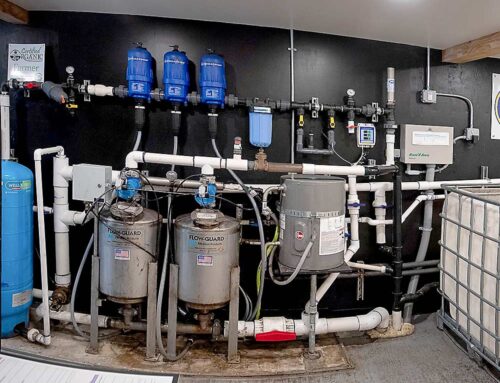
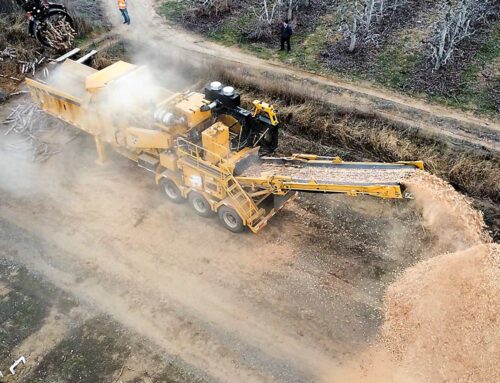
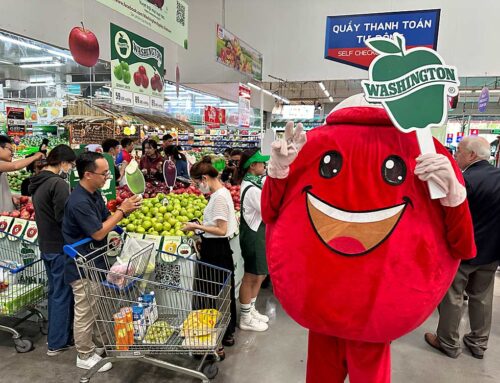

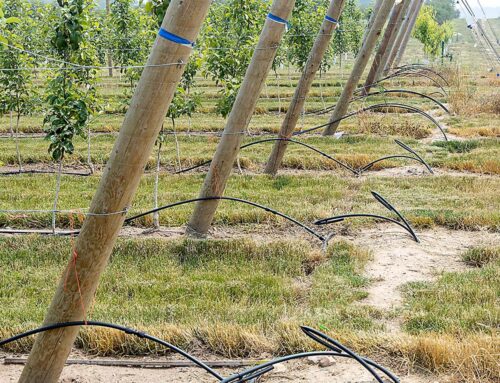
Richard it would be interesting to know if you came across any orchard managers utilizing the miniature heritage sheep breeds (eg southdowns, ouessants, microsheep etc) for weed management. I know this is especially the case in the cider orchards in the UK. Always keen to hear of non chemical based weed management strategies, given many producers’ temptations to move to organic conversion. I also hear that prices for non glyphosate herbicides like glufosinate and paraquat are likely to have bottomed as the broadacre soft and grain commodity producers begin in earnest to manage emerging glyphosate weed resistant issues. Thanks for the insight.
Aaron, here’s Richard’s reply: “We saw very few animals of any sort in the apple and grape areas of the valley. On a bus tour to higher altitudes, fruit gave way to open meadows where hay was harvested, but animals apparently were confined; at least, none were on open pasture.”